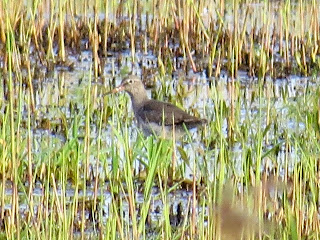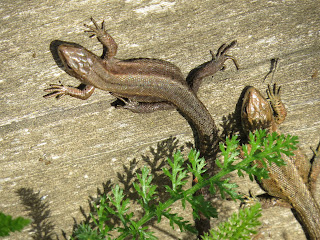 |
| St Mark's Fly |
With the Easter holidays now underway, the staff at Strumpshaw have set up activities for families. This includes a brand new temporary trail that takes you to the sand cliffs in the woods, which is usually out of bounds. Even I have never been close to these cliffs before. This is another great spot to watch the solitary bees and wasps, such as tawny mining bees, dig their nesting chambers. I was unable to spot any today, but I did find something else, a male St Mark's fly. This fly often emerges around St Mark's Day (April 25th), flying about with their legs dangling, but they seem to have emerge really early this year.
 |
| Bumblebee |
 |
| Cowslip |
 |
| Willow Warbler |
The willow warblers have returned and their cheerful song fills my ears once again. Pretty much everything is singing now, including song thrushes, blackcaps, chiffchaffs, wrens and even the bearded tits were pinging at Fen Hide. Redshanks and a little egret were seen briefly in front of the hide, while marsh harriers continued to sky dance. Cetti's warblers were shouting at the top of their lungs within the reeds and shrubs. I also heard a buzzard and I was searching for it high in the sky. However, this was actually not a buzzard but an imitation of one that I heard. The impersonator turned out to be a jay that was sitting in a tree beside me, hidden by the bright sunlight that shone into my eyes. I've never heard one do that before. It was a very convincing imitation. It sounded exactly like a mewing buzzard!
 |
| Song Thrush |
 |
| Wren |
 |
| Redshank |
 |
| Little Egret |
 |
| Pill Woodlouse |
While on my morning walk around the reserve, I was scanning the wooden borders of the Sandy Wall path for anything interesting. I came across a couple of lizards, some spiders and a couple of bumblebees and hoverflies. The best find, though, was this woodlouse. Why? Because it was one of my target species for my ultimate bug hunt challenge. I gave it a little prod to make sure that it was the species of woodlouse that I was after and to my relief, it rolled up into a tiny ball. It was a good sign. But there is a possibility that it isn't a woodlouse at all. Pill millipedes look almost exactly like my target, the pill woodlouse and the only way to be sure is to count the legs. I checked and there wasn't enough of them to be a millipede. This was indeed a pill woodlouse.
 |
| Common Lizard |
 |
| Spider of some kind |
 |
| Common Carder Bee |
 |
| Black Slug |
 |
| Ant |
 |
| Pill Woodlouse |
Amazing as it sounds, I don't think I have ever seen a pill woodlouse before, at least not a good look at one like this. The sections of armour plating that makes up it's body is smooth and well designed for rolling into a ball to protect it's soft underside from predators. This is the reason why I wanted to see this species in particular. Woodlice are crustaceans, meaning that they are related to crabs and lobsters. They play a big part in recycling the leaf litter and feed on the wood matter from logs and fallen branches. They are also prey to many things, including birds and hedgehogs. So there's a lot we should appreciate woodlice for.
 |
| Pill Woodlouse rolled into a ball |
 |
| Pochard |
At Reception Hide, the black-headed gulls are back in numbers again with many of them on or above the broad. I also saw a sparrowhawk, a kingfisher making a quick flyby, a pochard, coots, moorhens and several greylags. The jack snipe appears to have finally left for it's breeding grounds in Arctic Russia. I am going to miss it's constant bobbing in front of the hide for which it had entertained many visitors throughout March.
 |
| Black-headed Gull |
 |
| Sparrowhawk |
 |
| Pied Wagtail |
 |
| Greylag |
 |
| Peregrine |
Back in Norwich, I made a quick visit to the cathedral. The peregrines have returned to the nesting platform halfway up the spire. They have laid four eggs; the first was laid on March 19, the second on March 22nd, the third on March 24th and the fourth on March 27th. Hopefully, they will hatch somewhere around the last week of April or the first week of May. I shall update you with any news when I hear it.





































No comments:
Post a Comment